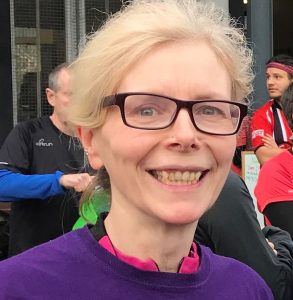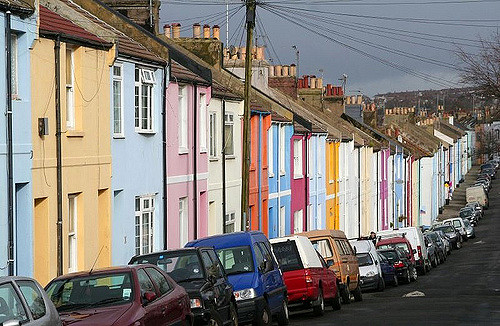People in Hanover had the first glimpse of what a low-traffic neighbourhood might look like before a pilot scheme planned for the area next summer.
They were given an outline of the “mini Holland” scheme in Waltham Forest, London, at a virtual meeting organised under the Livable Hanover banner on last night (Tuesday 15 December).
Green councillor Elaine Hills, who represents Hanover and Elm Grove, hosted the event to introduce the idea of a low-traffic neighbourhood before a public consultation and the proposed pilot.
She introduced the Labour deputy leader of Waltham Forest Borough Council, Clyde Loakes, who is responsible for transport, traffic and highways.
Councillor Loakes said that the £27 million project was a radical intervention to reduce traffic volumes and speeds without resorting to traditional traffic calming – and had transformed residential roads and shopping areas.
He said when the council there consulted local people, many were concerned that reducing access for cars and taking away parking would damage trade.
Councillor Loakes said: “One of the big issues we always get pushed back on is the need for businesses for parking. They love parking. They want parking.
“But if you look at studies done in London, in the UK and internationally, we know if people walk, cycle or take public transport to a shopping area, they will spend more money over the course of a year than anyone who arrives by car.”
He said that 2,500 drivers previously used one shopping street, Orford Road, every day, with cars parked on the pavement, making it impossible for wheelchair users or parents with buggies to pass.
The Dutch ambassador officially launched Waltham Forest’s “mini Holland”, with a timed closure allowing for buses and deliveries, enforced by cameras. The ambassador was surrounded by protesters against the scheme.
Councillor Loakes said that despite a positive response to the consultation, with a quarter of the community giving their views, the scheme resulted in the biggest protests there in 50 years.
He said: “You can see the difference you can make by introducing modal filters into residential areas.
“You take out the rat running, through traffic, non-local traffic that was using residential areas to by-pass traffic infrastructure that was designed to manage those amounts of traffic.”

In the streets where traffic restrictions were introduced, he said, the number of vehicles passing through decreased.
Free bike hire services were also introduced, including cargo bikes and electric-assisted bicycles, as well as secure parking.
During the Hanover meeting, people asked about deliveries, parking near their homes and carers visiting people who were old, ill or disabled.
Councillor Loakes said that residents and anyone else who needed to drive in a low-traffic area could still do so.
Hanover Action member and Belgrave Street resident Ian MacIntyre urged people to sign up to represent their streets.
In the new year, the group is starting its My Dream Street project to encourage people to talk about what they would like to see in the area.
Last June, Brighton and Hove City Council approved a pilot project as part of the Interim Covid-19 Response Local Cycling and Walking Infrastructure Plan, using money from the government’s emergency travel fund.









Hanover, like in HOLLAND, has no hills = glad there will be huge surveillence to catch the car drivers = gated community (or walled community) without the gates = posh = hash gardens/houses every where = god save us
I don’t think we need to get ourselves in too much of a lather, Brad: Betteridge’s law of headlines would suggest that this initiative is far from imminent.
Thank god for that – now I have to chat with Betteridge…
And get my gun …
I lived in Hanover for over thirty years.
It’s so funny to read these articles now.
Try cycling up Albion Hill or Southover street.
If we have extra traffic using the area as ‘rat runs’ then look at what the council has done to through routes – with the Valley Gardens scheme being an obvious example.
I spent most of my Hanover years walking everywhere. Sadly, the local bus routes take you all around the area, but never to where you want to go.
Quote from the article:
“But if you look at studies done in London, in the UK and internationally, we know if people walk, cycle or take public transport to a shopping area, they will spend more money over the course of a year than anyone who arrives by car.”
This is actually not true, or a misrepresentation of consumer activity.
Oh dear, sounds like another money-wasting vanity project from our mis-guided City Council!
The starting-point has to be how many households in Hanover have how many cars; why does each household with one or more cars want or need to have those vehicles; what alternatives, if any, to their vehicle ownership would these households like (and at what prices?); and what plans, if any, do the car-free households have to acquire a vehicle, and if none what improvements to existing transport facilities do they wish to see?
So that requires intensive survey work by experienced professionals, using multiple methods of consultation, to obtain meaningful responses from about 95% of Hanover households – so probably about 6 months of door-to-door surveying in the Summer, + maybe 4 months of desk-work with other forms of response, such as from social media + telephone calls etc.
So once the size and nature of the problem is known expert consultants (from Holland?) can develop the widest practicable range of partial solutions (there are few easy answers – one size does not fit all!).
However one obvious partial solution is to excavate the Brighton General site to several layers deep for a large-capacity underground car-park – not only to serve Hanover residents, but with a tunnel, incorporating a travelator like airports have, also serving RSCH staff & visitors. And with the roof of the car-park acting as a foundation to support the social housing needing to be built on that public land.
And how do the Hanover residents get between their homes and the car-park?
Ah yes; mostly on electric bikes included in the annual subscription for a car-park space – but in setting-up the City bike-hire scheme (now in financial trouble!) our Council failed to include e-bikes, even though Oxford already had a mixed fleet from the same provider!
Once our councillors, many of whom do seem to be quite intelligent and experienced, can free themselves from appearing to be afraid to contradict the Council’s paid staff perhaps we’ll at last see some common-sense being applied to more effective ways of solving our City’s many problems?
Virtue signalling, vanity project for the Metropolitan, Cyclist cult.
Those that voted for the Green Goons and Labour Loons, rejoice.
Pathetic council.
Complete fantasy land thinking, yet again, from the deluded morons that were, somehow, voted in as councillors.
What a joke.
Why are we obsessed with Holland? A population smaller than greater London,
A flat country just a third the size of England, what may work for them might quite simply be unachievable for us because of size, population density and topography – it’s apples and pears.